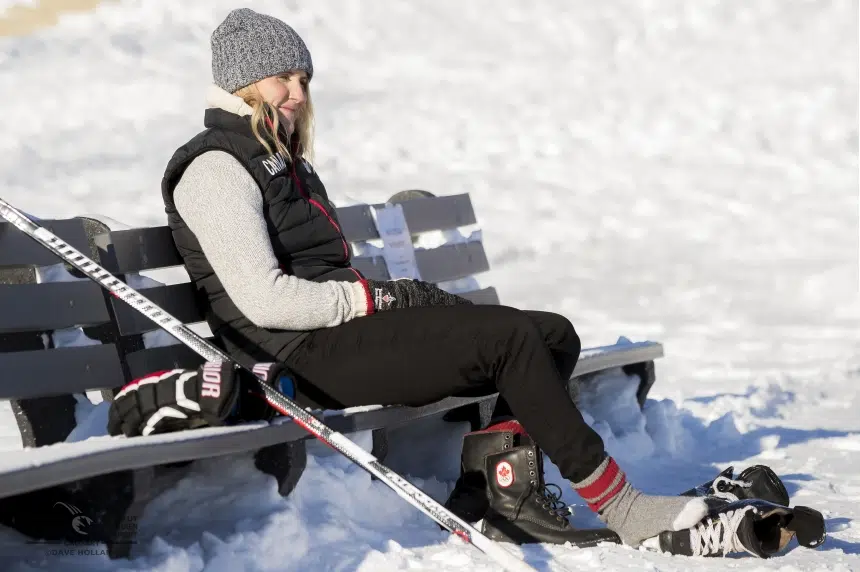Hayley Wickenheiser may be heading for the Hockey Hall of Fame in Toronto, but a good part of her remains in Shaunavon.
During a conversation with The Green Zone’s Jamie Nye on Thursday, Wickenheiser said her hometown was on her mind after she discovered Tuesday that she had been selected for induction into the Hall.
“I was thinking about Shaunavon at 8 a.m., on a Saturday morning, two-hour practices with a cheeseburger and fries to follow, hanging out at the rink all day, all these hockey tournaments, barnstorming southwest Saskatchewan, the outdoor rinks that I played on growing up, and all the people in the community of Shaunavon who propped me up,” recalled Wickenheiser, 40. “There were just so many people through the years.
“At every stage I went in my hockey career, that town and the people in it were always behind me. I feel really lucky to have grown up in such an atmosphere. It really is a big reason why I was able to achieve anything in hockey.”
Wickenheiser achieved quite a bit.
She won four Olympic gold medals and seven world championships with Canada’s women’s hockey team. She played 23 years on the national team and retired as its all-time leading scorer.
She had stints with men’s teams in Finland and Sweden, played in the Western Women’s Hockey League and spent time with the University of Calgary Dinos women’s team.
She retired from the national program in January of 2017, having joined it as a 15-year-old.
“Obviously (starting early) was great for me because I was around women who were professional people,” Wickenheiser said. “They had jobs, they had lives, they were grown adults. My first roommate was Margot Page, who was a Grade 10 math teacher and I was a Grade 10 math student, so it put things into perspective.
“These women were true pros. They sacrificed a lot to play the game and they taught me what it meant to train and be a professional and appreciate everything that I had playing for Canada. I was around such a great environment early on and that definitely influences you.”
During her tenure with the Canadian team, Wickenheiser and her cohorts helped influence women’s hockey players in the country — and around the world.
By the time Wickenheiser left the women’s game, it had grown exponentially.
“Every Olympic Games, we could see the participation in women’s hockey grow by almost 50 per cent the next year, so that’s how important it was to the survival and the growth of the game in this country,” she said. “That’s a real thing — you have to see it to believe it.
“When I was a little girl, I didn’t know there was another girl playing hockey, to be honest. I thought I was the only one and I had the Oilers, (Mark) Messier and (Wayne) Gretzky who I looked up to. But now lots of Canadian girls can name lots of girls on the national team.
“It’s because of that visibility. It’s super-important that we continue to have that and that there’s a place for young girls to play because hockey is truly a game for everyone.”
Wickenheiser and her colleagues in the Class of 2019 — fellow players Guy Carbonneau, Vaclav Nedomansky and Sergei Zubov and builders Jim Rutherford and Jerry York — are to be inducted into the Hockey Hall of Fame during a ceremony on Nov. 18.
They all got the call Tuesday, although Wickenheiser didn’t technically get it.
She was in a classroom at medical school when Hall of Fame chairman Lanny McDonald called to say she had been selected for induction. Wickenheiser couldn’t take the call, so McDonald sent her a text with the information.
When the news got out, Wickenheiser’s phone blew up with texts. She eventually got out of class and called McDonald back.
She got more congratulations when she returned to her job as the Toronto Maple Leafs’ assistant director of player development.
Even though she’s not playing any longer, Wickenheiser may be busier than she was when she suited up.
“I like both,” she said of being a student and being employed by the NHL’s Leafs. “Medicine gives me the perspective. When you deal with human lives, it’s one thing to have the pressure to be the best in the world, but it’s a whole other thing to be the best for the world.
“In the same way, with hockey, you try to impart on the young players that it’s a moment that you don’t want to waste because they’re very lucky to have made it as far as they have already — and some of them will ultimately be able to live a dream like I did.”











